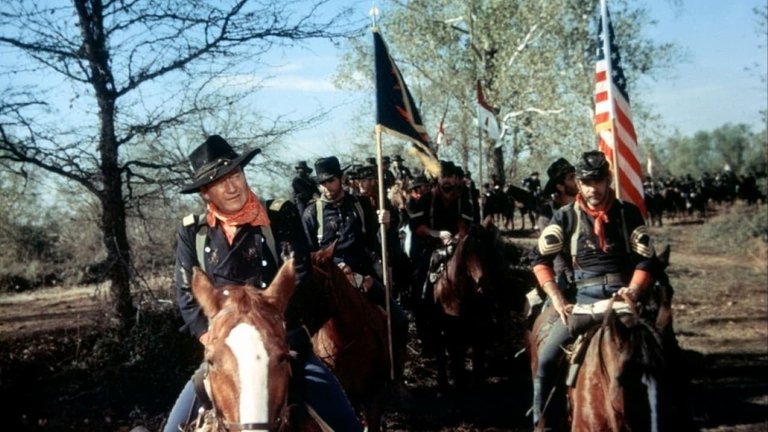Film Review: The Horse Soldiers (1959)

The boundaries of film genres are often a topic of lively debate, with even the most clearly defined categories subject to interpretation. This is particularly true for the Western genre, which has evolved over time and can encompass a variety of themes and narratives. A notable example of this complexity is found in John Ford's 1959 film The Horse Soldiers. While the film features many elements characteristic of Westerns—such as cavalry uniforms and gunfights—it diverges from traditional Western tropes by situating its narrative within the context of the American Civil War. Thus, it can be viewed as a Western in spirit but not in the strictest sense.
The Horse Soldiers is based on Harold Sinclair's popular 1956 novel, which offers a fictionalised account of Grierson's Raid, the first successful major cavalry operation conducted by Union forces during the Civil War. The plot begins in the spring of 1863, when Colonel John Marlowe (played by John Wayne), the commander of a cavalry brigade, is summoned by General Ulysses Simpson Grant (played by country singer Stan Jones in uncredited role). The war haven’t gone to well for the Union in past two years, but Grant is determined to change that by capturing the strategically important Confederate fortress at Vicksburg on the Mississippi River. Marlowe is tasked with leading his brigade deep into Confederate territory to destroy railroad tracks and supply depots, hoping to divert the superior Confederate cavalry from the front. However, tensions arise between Marlowe and Major Henry “Hank” Kendall (William Holden), the brigade’s surgeon, even before their raid commences. Later, their conflict intensifies when Marlowe takes Miss Hannah Hunter (Constance Towers), owner of Greenbriar Plantation, prisoner after she overhears their plans to advance further south instead of retreating north.
Ford's film shares thematic similarities with some of his most renowned Cavalry Westerns, featuring iconic characters clad in US Cavalry uniforms and accompanied by a memorable theme song, "I Left My Love," performed by Stan Jones. However, The Horse Soldiers distinguishes itself through its historical setting; rather than facing Native American adversaries typical in Westerns, the US Cavalry confronts Confederate forces in a conflict that is depicted as brutally destructive and fratricidal. The film does not shy away from illustrating the horrors of war; numerous characters suffer grievous injuries or death, exemplified by Dunker (played by Bing Russell, father of Kurt Russell), who loses a leg. While Ford was known for his patriotic themes and martial spirit—having served in World War II—The Horse Soldiers presents a tone that some contemporary critics interpreted as pacifist.
Despite any messages Ford intended to convey regarding war and its consequences, these themes become muddled due to a messy script that suffers from tonal inconsistencies and awkward attempts at humour. A particularly jarring scene involves Confederates entire class of military academy cadets—most of whom are children—into battle against Marlowe’s men. The Union cavalrymen, more amused than concerned, wisely choose to retreat rather than risk harming young boys. This scene is based on real events that occurred later in the war but tragically ended differently than depicted in the film.
As a high-budget Hollywood production, The Horse Soldiers conformed to certain industry formulas that necessitated the inclusion of significant female characters and romantic subplots. Constance Towers delivers a commendable performance as Hannah Hunter; however, her character's sudden attraction to Marlowe feels somewhat unconvincing given their initial hostilities and opposing allegiances. This romantic tension adds complexity but also detracts from the film’s overall narrative coherence.
In addition to its narrative elements, The Horse Soldiers was notable for its casting choices that aimed to reflect demographic diversity. Althea Gibson, an accomplished tennis player who broke racial barriers as the first African American woman to win a Grand Slam title, was cast as Lukey, Hannah's maidservant. Unfortunately for Gibson, her acting career did not flourish following this role, which proved her first and last; she faced challenges due to her height and her refusal to adopt an exaggerated "Negro" dialect deemed demeaning by her.
The production itself was fraught with difficulties stemming from tensions between Ford and Wayne, who was increasingly preoccupied with his own directorial debut on The Alamo. However, the most significant setback occurred with the tragic death of veteran stuntman Fred Kennedy during filming. Ford felt responsible for this accident and became disenchanted with the project; he even refused to complete certain scenes from the script. Consequently, while the film concludes adequately, it lacks the climactic impact that one might expect from such an ambitious project.
Despite its imperfections and being considered one of Ford’s lesser works, The Horse Soldiers remains a noteworthy film worthy of recommendation—even for those who may not typically gravitate towards Westerns or narratives centred around the American Civil War. It offers viewers an engaging blend of action and historical context while exploring deeper themes related to warfare and human conflict. The film serves as both an entertaining spectacle and a reflection on the complexities inherent in war—a hallmark of John Ford’s cinematic legacy.
RATING: 6/10 (++)
Blog in Croatian https://draxblog.com
Blog in English https://draxreview.wordpress.com/
InLeo blog https://inleo.io/@drax.leo
Hiveonboard: https://hiveonboard.com?ref=drax
Rising Star game: https://www.risingstargame.com?referrer=drax
1Inch: https://1inch.exchange/#/r/0x83823d8CCB74F828148258BB4457642124b1328e
BTC donations: 1EWxiMiP6iiG9rger3NuUSd6HByaxQWafG
ETH donations: 0xB305F144323b99e6f8b1d66f5D7DE78B498C32A7
BCH donations: qpvxw0jax79lhmvlgcldkzpqanf03r9cjv8y6gtmk9
Posted Using InLeo Alpha